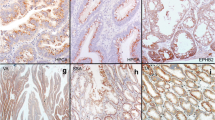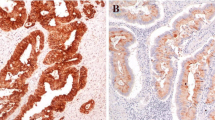Abstract
Background and aims
Although the role of transforming growth factor beta (TGFbeta) 1 and metalloproteinase-9 (MMP-9) is well documented in colorectal cancer (CC), there is a little evidence supporting its role in early carcinogenesis. The aim of the study was to determine the pattern of immunohistochemical expression of TGFbeta1, MMP-9, and Ki-67 in CC and adenomatous polyps.
Patient/methods
The study group comprised 50 patients with colorectal polyps and 33 patients with CC. Endoscopically removed polyps and CC biopsies had been evaluated with histopatologic examination and immunohistochemistry. The biopsies from 30 healthy objects served as a control group. For all antibodies labeling indices (LI) had been calculated.
Results
Among 62 adenomas, 33 high-grade dysplasia (HGD) and 29 low-grade dysplasia (LGD) had been detected. Mean TGFbeta1, MMP-9, and Ki-67 LI in CC were significantly higher (p < 0.01, 0.01, and 0.01, respectively) than in HGD polyps. Mean TGFbeta1, MMP-9, and Ki-67 LI in HGD polyps were significantly higher than in LGD polyps (p < 0.01, 0.01, and 0.01, respectively). There had been no statistical difference in TGFbeta1, MMP-9, and Ki-67 LI between LGD and the control group (p > 0.05, 0.05, and 0.05, respectively). There was a positive correlation between TGFbeta1 and MMP-9 (r = 0.898), Ki-67 and MMP-9 (r = 0.938), and TGFbeta1 and Ki-67 (r = 0.913). We did not observe any correlation between TGFbeta1, MMP-9, Ki-67 LI and the clinical parameters evaluated.
Conclusion
The increased expression of TGFbeta1, MMP-9 observed in colorectal adenomas seems to be related to the grade of dysplasia. We assume that overexpression of TGFbeta1, MMP-9 represent an early event in colorectal carcinogenesis and may possibly have the prognostic value.





Similar content being viewed by others
References
Sehgal I, Baley AP, Thompson T (1996) Transforming growth factor β1 stimulates contrasting responses in metastatic versus primary mouse prostate cancer-derived cell lines in vitro. Cancer Res 56:3359–3365
Bellone G, Carbone A, Tibaudi D, Mauri F, Ferrero I, Smirne C, Suman F, Rivetti C, Migliaretti G, Camandona M, Palestro G, Emmanueli G, Rodeck U (2001) Differential expression of transforming growth factors-β1, -β2, -β3 in human colon carcinoma. Eur J Cancer 37:224–233
Massague J (1998) TGF β signal transduction. Annu Rev Biochem 67:753–791
Matsushita M, Matsuzaki K, Date M, Watanabe T, Shibano K, Nakagawa T, Yanagitani S, Amoh Y, Takemoto H, Ogata N, Yamamoto C, Kubota Y, Seki Y, Inokuchi H, Nishizawa M, Takada H, Suwamura T, Okamura A, Inoue K (1999) Down-regulation of TGF β receptors in human colorectal cancer: implications for cancer development. Br J Cancer 80(1/2):194–205
Blobe G, Schieman W, Lodish H (2000) Role of transforming growth factor β in human disease. New Engl J Med 342:1350–1358
Ravitz MJ, Wenner CE (1997) Cyclin-dependent kinase regulation during G1 phase and cell cycle regulation by TGF β. Adv Cancer Res 71:165–207
Villanueva A, Garcia C, Paules AB, Vincente M, Megias M, Reyes G, de Villalonga P, Agell N, Lluis F, Bachs Q, Capella G (1998) Disruption of the antiproliferative TGF-β signaling pathways in human pancreatic cancer cells. Oncogene 17:1969–1978
Grady WM, Myeroff LL, Swinler SE, Rajput A, Thiagalingam S, Lutterbaugh JD, Neumann A, Brattain MG, Chang J, Kim SJ, Kinzler KW, Vogelstein B, Willson JK, Markowitz S (1999) Mutational inactivation of transforming growth factor β receptor type II in microsatellite stable colon cancers. Cancer Res 59:320–324
Roberts AB, Wakefield LM (2003) The two faces of transforming growth factor β in carcinogenesis. Proc Natl Acad Sci USA 100:8621–8623
Galliher AJ, Neil JR, Schieman WP (2006) Role of transforming growth factor beta in cancer progression. Future Oncol 2(6):743–763
Pardali K, Moustakas A (2007) Actions of TGF-beta as tumor suppressor and pro-metastatic factor in human cancer. Biochim Biophys Acta 1775(1):21–62
Zeng ZS, Guillem GJ (1995) Distinct pattern of matrix metalloproteinase 9 and tissue inhibitor of metalloproteinase 1 mRNA expression in human colorectal cancer and liver metastases. Br J Cancer 72:575–582
Chambers AF, Matrisian LM (1997) Changing views of the role of matrix metalloproteinases in metastasis. J Natl Cancer Inst 89:1260–1270
Bernahrd EJ, Muschel RJ, Huges EN (1990) Mr 92,000 gelatinase release correlates with the metastatic phenotype in transformed rat embryo cells. Cancer Res 50:3872–3877
Yamagata S, Tanaka R, Ito Y, Shimuzu S (1989) Gelatinases of murine metastatic tumor cells. Biochem Biophys Res Commun 158:228–234
Mook OR, Frederix WM, Van Noorden CJ (2004) The role of gelatinases in colorectal cancer progression and metastasis. Biochim Biophys Acta 17;1705(2):69–89
Brown P, Bloxidge R, Stuart S, Gatter K, Carmichael J (1993) Association between expression of activated 72-kilodalton gelatinase and tumor spread in non-small-cell lung carcinoma. J Natl Cancer Inst 85:574–578
Brown P, Bloxidge RE, Anderson E, Howel A (1993) Expression of activated gelatinase in human invasive breast carcinoma. Clin Exp Metastasis 11:183–189
Naylor MS, Stamp GW, Davies BD, Balkwill FR (1994) Expression and activity of MMPS and their regulators in ovarian cancer. Int J Cancer 58:50–56
Satoh K, Ohtani H, Shimosegawa T, Kaizumi M, Sawai T, Toyota T (1994) Infrequent stromal expression of gelatinase A and intact basement membrane in intraductal neoplasms of the pancreas. Gastroenterology 107:1488–1495
Ennis BW, Matrisian LM (1994) Matrix degrading metalloproteinases. J Neurooncol 18:105–109
Salminen E, Palmu S, Vahlberg T, Roberts PJ, Sodersttrom KO (2005) Increased proliferation activity measured by immunoreactive Ki67 is associated with survival improvement in rectal/recto-sigmoid cancer. World J Gastroenterol 11(21):3245–3249
Ishida H, Sadahiro S, Suzuki T (2003) Proliferative, infiltrative and metastatic activities in colorectal tumors assessed by MIB-1 antibody. Oncol Rep 10(6):1741–1745
Valera V, Yokoyama N, Walter B, Okamoto H, Suda T, Hatekeyama K (2005) Clinical significance of Ki-67 proliferation index in disease progression and prognosis of patients with resected colorectal carcinoma. Br J Surg 92:1002–1007
Baker EA, Leaper DJ (2002) Measuring gelatinase activity in colorectal cancer. Eur J Surg Oncol 28(1):24–29
D’Errico A, Garbisa S, Liotta LA, Castronovo V, Stetler-Stevenson WG, Grigioni WF (1991) Augmentation of type IV collagenase, laminin receptor, and Ki67 proliferation antigen associated with human colon, gastric, and breast carcinoma progression. Mod Path 4(2):267–280
Cardillo MB, Yap E (1997) TGFbeta1 in colonic neoplasia: a genetic molecular and immunohistochemical study. J Exp Clin Cancer Res 16(3):281–288
Matsushita M, Matsuzaki K, Date M, Watanabe T, Shibano K, Nakagawa T, Yanagitani S, Amoh Y, Takemoto H, Ogata N, Yamamoto C, Kubota Y, Seki T, Inokuchi H, Nishizawa M, Takada H, Sawamura T, Okamura A, Inoue K (1999) Down-regulation of TGF beta receptors in human colorectal cancer: implications for cancer development. Br J Cancer 80(1/2):194–205
Parsons SL, Watson SA, Collins HM, Griffin NR, Clarke PA, Steele RJ (1998) Gelatinase (MMP-2 and MMP-9) expression in gastrointestinal malignancy. Br J Cancer 78(11):1495–1502
Tomita T, Iwata K (1996) Matrix metalloproteinases and tissue inhibitors of metalloproteinases in colonic adenomas-adenocarcinomas. Dis Colon Rectum 39:1255–1264
Sobin LH, Wittekind C (eds) (2002) TNM classification of malignant tumors, 6th edn. Wiley, New York
Hamilton SR, Aaltonen LA (2000) WHO classification of tumors pathology and genetics. Tumors of the digestive system. IARC Press, Lyon
Xiong B, Yuan HY, Hu MB, Zhang F, Wei ZZ, Gong LL, Yang GL (2002) Transforming growth factor beta 1 in invasion and metastasis in colorectal cancer. World J Gastroenterol 8(4):674–678
Roberts AB, Wakefield LK (2003) The two faces of transforming growth factor beta in carcinogenesis. Proc Natl Acad Sci USA 100(15):8621–8630
Avery A, Paraskeva C, Hall P, Flanders KC, Sporn M, Moorghen M (1993) TGF beta expression in the human colon: differential immunostaining along crypt epithelium. Br J Cancer 68:137–139
Maehara Y, Kakeji Y, Kabashima A, Emi Y, Watanabe A, Akazawa K, Baba H, Kohnoe S, Sugimachi K (1999) Role of transforming growth factor beta in invasion and metastasis in gastric carcinoma. J Clin Oncol 17:607–614
Von Rahden BH, Stein HJ, Feith M, Puhringer F, Thiesen J, Siewert JR, Sarbie M (2006) Overexpression of TGF-beta1 in esophageal (Barrett’s) adenocarcinoma is associated with advanced stage of disease and poor prognosis. Mol Carcinog 45(10):786–794
Robson H, Anderson E, James RD, Shofield PF (1996) Transforming growth factor beta 1 expression in human colorectal tumors: an independent prognostic marker in a subgroup of poor prognosis patients. Br J Cancer 74(5):753–758
Shimizu S, Nishikawa Y, Kuroda K, Takagi S, Kozaki K, Hyuga S, Saga S, Matsuyama M (1996) Involvement of transforming growth factor beta 1 in autocrine enhancement of gelatinase B secretion by murine metastatic colon carcinoma cells. Cancer Res 56:366–3370
Berger DH, O’Mahony CA, Sheng H, Shao J, Albo D, DuBois RN, Beauchamp RD (2003) Intestinal transformation results in transforming growth factor beta-dependent alteration in tumor cell–cell matrix interaction. Surgery 133(5):568–579
Parsons SL, Watson SA, Collins HM, Griffin NR, Clarke PA, Steele RJ (1998) Gelatinase (MMP-2 and MMP-9) expression in gastrointestinal malignancy. Br J Cancer 78(11):1495–1502
Zeng ZS, Cohen AM, Guillem JG (1999) Loss of basement type IV collagen is associated with increased expression of metalloproteinases 2 and 9 (MMP-2 and MMP-9) during human colorectal tumorogenesis. Carcinogenesis 20(5):749–755
Tomita T, Iwata K (1996) Matrix metalloproteinases and tissue inhibitors of metalloproteinases in colonic adenomas-adenocarcinomas. Dis Colon Rectum 39:1255–1264
Moran A, Iniesta P, Garcia Avanda C, De Juan C, Diaz-Lopez A, Sanchez-Pernaute A, Torres Aj, Diaz-Rubio E, Balibrea JL, Benito M (2005) Clinical relevance of MMP9, MMP2, TIMP-1, and TIMP-2 in colorectal cancer. Oncol Rep 13(1):115–120
Saleh H, Jackson H, Khatib G, Banerjee M (1999) Correlation of bcl-2 oncoprotein immunohistochemical expression with proliferation index and histopathologic parameters in colorectal neoplasia. Pathol Oncol Res 5(4):273–279
Johnston PG, O’Brien MJ, Dervan PA, Carney DN (1989) Immunohistochemical analysis of cell kinetic parameters in colonic adenocarcinomas, adenomas, and normal mucosa. Hum Pathol 20(7):696–700
Saleh HA, Jackson H, Banerjee M (2000) Immunohiostochemical expression of bcl-2 and p53 oncoproteins: correlation with Ki-67 proliferation index and prognostic histopathologic parameters in colorectal neoplasia. Appl Immunohistochem Mol Morphol 8(3):175–182
Suzuki H, Matsumoto K, Terobe M (1992) Ki-67 antibody labeling index in colorectal carcinoma. J Clin Gastroenterol 15(4):317–320
Kyzer S, Gordon PH (1997) Determination of proliferative activity in colorectal carcinoma using monoclonal antibody Ki67. Dis Colon Rectum 40(3):322–325
Porshen R, Lohe B, Hengels KJ, Borchard F (1989) Assessment of cell proliferation in colorectal carcinomas using the monoclonal antibody Ki-67. Correlation with pathohistologic criteria and influence of irridation. Cancer 64(12):2501–2505
Oshima CT, Iriya K, Forones NM (2005) Ki-67 as a prognostic marker in colorectal cancer but not in gastric cancer. Neoplasma 52(5):420–424
Jansson A, Sun XF (1997) Ki-67 expression in relation to clinicopathological variables and prognosis in colorectal adenocarcinomas. APMIS 105(9):730–734
Acknowlegment
The project was supported by the State Committee for Scientific Research, grant no. 507-11-283 to E. M. P. and the Medical University of Lodz grant no. 502-11-308 to P. D.
Author information
Authors and Affiliations
Corresponding author
Rights and permissions
About this article
Cite this article
Daniel, P., Wagrowska-Danilewicz, M., Danilewicz, M. et al. Transforming growth factor beta 1 and metalloproteinase-9 overexpression in colorectal cancer (CC) and adenoma. Int J Colorectal Dis 22, 1165–1172 (2007). https://doi.org/10.1007/s00384-007-0296-9
Accepted:
Published:
Issue Date:
DOI: https://doi.org/10.1007/s00384-007-0296-9




